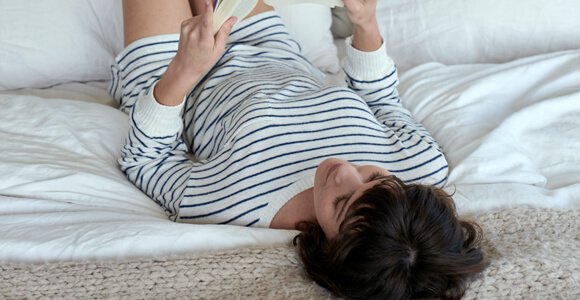
Joyce Mcneill is a high-energy person. But five years ago, she found herself constantly exhausted, and didn't know why.
"Regardless of when I went to bed, I was always tired," McNeill says.
She was diagnosed with sleep apnea, a condition marked by the narrowing of the airways during sleep, causing a person to semiconsciously wake throughout the night. Today, a machine keeps her airways open during sleep.
While her sleep apnea treatment helped, McNeill still wasn't getting a full night's sleep. So, when she had back surgery two years ago and her orthopedic surgeon suggested that regular massage might help her back and her sleeping, she was willing to try it.
He was right, she says. "It's really been beneficial," McNeill says. "The big difference is that my muscles are more relaxed." And that, she notes, helps her fall back to sleep easily should she awake in the night.
McNeill is not alone. Many people are using massage as a way to help them get a better night's sleep-something health experts say is necessary for good health.
Why Sleep Matters
"Sleep provides a vital function," says Lawrence Epstein, M.D., author of The Harvard Medical School Guide to a Good Night's Sleep (McGraw Hill, 2006) and chief medical officer for Sleep HealthCenters. "It's when wrow and repair the body."
He explains that people who are chronically sleep-deprived have a reduced ability to perform cognitive tasks and an increased risk of workplace and automobile accidents.
Research also shows that sleep deprivation may be leading to significant health problems, such as obesity, cardiovascular disease and diabetes, Dr. Epstein says.
"People aren't just feeling sleepy, they are actually harming themselves," he says. "Several studies have suggested that people who get short amounts of sleep even have greater mortality-that is, shorter life spans-than people who get more sleep."
Shawn M. Talbott, Ph.D., a nutritional biochemist and author of The Cortisol Connection, (Hunter House, 2002) notes that cortisol, the body's primary stress hormone, is about 50 percent higher in people who get only six hours of sleep a night.
Increased cortisol levels, he says, are connected to increased hunger, problems with blood sugar, high levels of abdominal fat, fatigue and depression.
How Massage Can Help
So how can massage help you get your cortisol levels under control?
"You're less likely to have stress interfering with your sleep," Dr. Talbott says. "There are some good studies that show that massage can actually reduce some of the stress hormone exposure."
Joe Bob Smith, a staff member at the National Holistic Institute in Studio City, Calif., and a massage therapist, says much of the research on massage isn't detailed enough to explain the exact processes, but anecdotally, he sees the impact.
"People who have sleep disorders typically don't get rested when they sleep," Smith explains. During a massage, they go into a deep state of relaxation, and rest, which can positively affect the body similar to sleep.
The massage, he says, encourages relaxation that's otherwise missing in their lives.
"It's essentially affecting the hormone levels," Smith says. "Studies have shown that massage increases serotonin, which increases the melatonin and helps circadian rhythms to reset."
McNeill, who enjoys massages a couple times a month, notices the difference. "I think my body is much more in tune," she says, adding that she often falls asleep on the table.
As the practice of massage has progressed, Smith says, more forms of massage have developed, including hot stone massage, aromatherapy and cranial sacral therapy. No matter the approach, the goal is improved health and wellness. "Pure relaxation massage has its benefits," Smith says. "And one of them is sleep."



